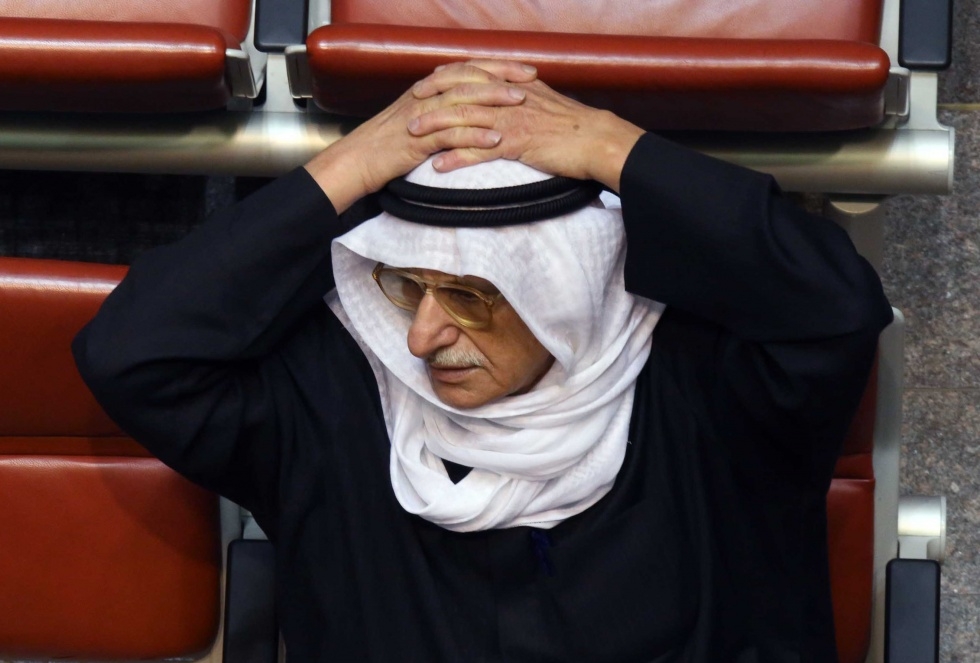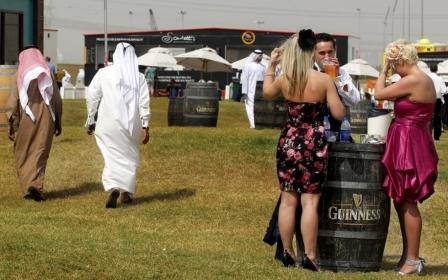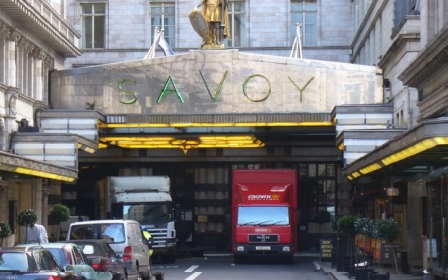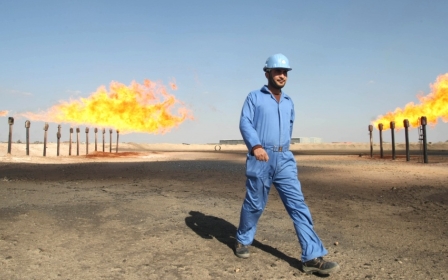Gulf monarchies brace for tough times over oil price plunge
Analysts said the Gulf states have missed an 'important opportunity' to diversify their economies and face hardship over the drop in oil prices

A Kuwaiti trader follows the market's movement at the Stock Exchange in Kuwait on 18 December (AFP)
Published date: Vendredi 13 février 2015 - 07:15
|
Last update: 9 années 9 mois ago
by Omar Hasan
Gulf countries are bracing for tough times as vital oil revenues fall and after they missed a golden opportunity to diversify their economies in a decade of unprecedented windfalls, analysts say.
The six nations of the Gulf Cooperation Council (GCC) -- Bahrain, Kuwait, Oman, Qatar, Saudi Arabia and the United Arab Emirates -- could soon start reeling from falling oil prices, which have dropped by half from their 2014 highs to around $60 a barrel.
Pumping about 17.5 million barrels per day, GCC countries are forecast to lose at least half their oil revenues, or around $350 billion a year, at current price levels.
Oil revenues make up around 90 percent of income for most GCC states and with prices now below budget forecasts, their governments are looking at certain deficits next year.
Spending cuts are sure to follow -- and possibly even the region's first taxes -- raising fears of public discontent and eventually an economic slowdown.
The oil price drop has also sent Gulf stock prices plummeting, wiping out billions of dollars of market value across the region and hurting major private firms like developer Emaar Properties and builder Arabtec Holding.
The heart of the problem, leading Kuwaiti economist Jassem al-Saadun said, is that Gulf states failed to seize on surging energy revenues to build up their economies outside the oil sector.
"Gulf states have missed an important opportunity to reform and build a real diversified economy," Saadun said.
"Public spending has soared to new record highs and it was not for vital infrastructure projects to diversify the economy," Saadun said.
"It was mostly for wages, salaries and subsidies... and handouts for buying political loyalty especially after the Arab Spring."
Reserves only 'temporary cushion'
Economists are warning that even with the huge reserves many have built up, a prolonged drop in oil prices will hit Gulf states hard.
"The prevailing growth model for most oil-exporting countries has left them vulnerable to a sustained decline in oil prices," the International Monetary Fund said in a research bulletin last week headlined: "It is high time to diversify".
Ratings agency Standard & Poor's is warning that an extended decline in oil prices will likely slow the Gulf economies, reducing spending on their massive infrastructure projects and hitting the private sector.
S&P has lowered its outlooks for Saudi Arabia, Oman and Bahrain, though it has maintained their ratings because of their impressive reserves.
The IMF has said that -- barring Oman and Bahrain, which are already in deficit -- GCC states will not be greatly affected in the short-term as they can tap into reserves estimated at $2.5 trillion.
But these funds, the IMF warned, will "only provide a temporary cushion".
In some parts of the region, the belt-tightening has already begun.
Regional powerhouse Saudi Arabia has insisted it will maintain its high spending levels by tapping into reserves.
But Kuwait has ordered major spending cuts and is considering lifting petrol and electricity subsidies.
In the UAE, Dubai has announced plans to raise electricity and water charges. Similar measures are expected by other countries.
'Options are no longer easy'
Moody's Ratings said Gulf countries are likely to start with cuts in spending on "non-strategic investment projects" but will eventually face tough choices.
"Slowing or even reversing the growth in current government spending, including subsidy reforms, will be more difficult as governments seek to meet social welfare demands," the agency said.
As oil revenues in Gulf states surged from about $100 billion in 2000 to $729 billion last year, public spending grew from about $150 billion to $547 billion, according to IMF figures.
But the spending focused mostly on items like wages and subsidies -- not crucial capital investment.
"Current expenditure has surpassed capital spending by miles," said M.R. Raghu, head of research at Kuwait Financial Center (MARKAZ).
Cutting that spending now is difficult as it means taking courageous decisions on wage and subsidy reforms, experts say.
The Gulf states have adopted a generous cradle-to-grave welfare system with highly subsidised services and fuel and no taxation.
The World Bank has urged GCC states to start immediate cuts to energy subsidies, which cost them more than $160 billion annually, and Saadun said it was "inevitable" they would have to start introducing taxes.
Such moves would prove deeply unpopular. But Saadun said putting them off would eventually make more drastic efforts necessary, which could spark the kind of social unrest that has hit other countries in the region.
"Yes, these measures are politically sensitive, but the alternative is an Arab Spring in the Gulf. Options are no longer easy."
Middle East Eye propose une couverture et une analyse indépendantes et incomparables du Moyen-Orient, de l’Afrique du Nord et d’autres régions du monde. Pour en savoir plus sur la reprise de ce contenu et les frais qui s’appliquent, veuillez remplir ce formulaire [en anglais]. Pour en savoir plus sur MEE, cliquez ici [en anglais].




